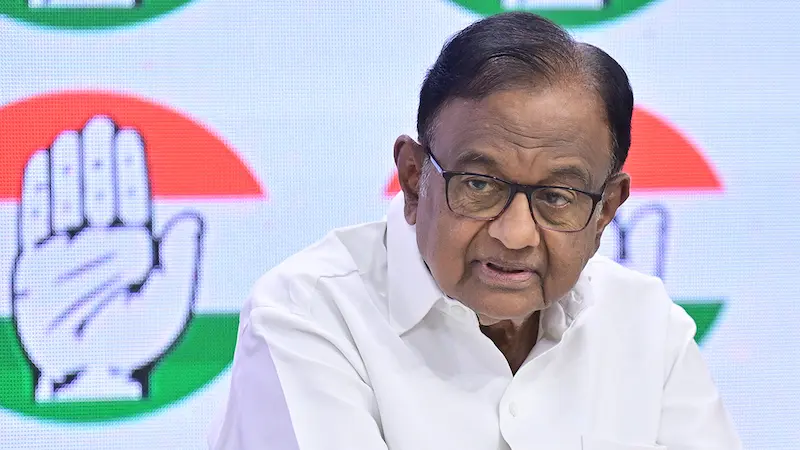
Chidambaram’s Explosive Remark Ignites Political Uproar
In a nation still reeling from the Pahalgam terror attack, a single question posed by senior Congress leader P. Chidambaram has ignited a fierce political debate: “Why do you assume that they came from Pakistan?” The remark, made during an interview with The Quint, has drawn sharp criticism from the ruling Bharatiya Janata Party (BJP) and triggered a broader conversation about national security, political accountability, and the role of evidence in counter-terror narratives.
The Pahalgam Attack: A Nation in Mourning
On April 22, 2025, gunmen opened fire on tourists in Baisaran Valley, Pahalgam, killing 26 civilians and injuring 16 others. The brutality of the attack, reportedly targeting victims based on religious identity, shocked the nation and prompted swift military retaliation under Operation Sindoor, which targeted terror camps in Pakistan and Pakistan-occupied Kashmir (PoK).
The National Investigation Agency (NIA) later arrested two local men who allegedly sheltered the attackers. According to official statements, the attackers were Pakistani nationals affiliated with Lashkar-e-Taiba (LeT), though their names have not been publicly disclosed due to security protocols.
Chidambaram’s Controversial Question
In the days leading up to a crucial parliamentary debate on Operation Sindoor, P. Chidambaram, former Home and Finance Minister, questioned the government’s narrative. Speaking to The Quint, he asked:
“Why do you assume that they came from Pakistan? There’s no evidence of that. For all we know, they could be homegrown terrorists.”
He also criticized the government’s handling of the investigation, accusing it of withholding information about the attackers’ identities and the extent of Indian casualties during Operation Sindoor.
BJP’s Swift and Scathing Response
The BJP wasted no time in responding. Union Minister Anurag Thakur accused Congress of consistently failing to hold Pakistan accountable for terrorism, citing the party’s response to the 26/11 Mumbai attacks as an example.
Amit Malviya, head of the BJP’s IT cell, posted a clip of Chidambaram’s interview on X (formerly Twitter), calling him a “repeat offender” who “sounds like Islamabad’s defence lawyer”. Shehzad Poonawalla, another BJP spokesperson, echoed the sentiment, saying:
“Congress ka haath, Pakistan ke saath.”
Even Arun Govil, BJP MP and actor known for portraying Lord Ram, weighed in, calling Chidambaram’s statement “the biggest lie in the world”.
Congress Pushes Back
Chidambaram defended his remarks, accusing critics of selective outrage and misrepresenting his interview. He posted on X:
“The worst kind of troll is one who suppresses the full recorded interview, takes two sentences, mutes some words, and paints the speaker in a black colour!”
His son, Karti Chidambaram, also a Congress MP, urged people to watch the full interview before forming opinions.
The Evidence Debate
At the heart of the controversy lies a fundamental question: What constitutes sufficient evidence in attributing a terror attack to a foreign entity? The NIA claims the attackers were Pakistani nationals, but has not publicly released their names. Chidambaram’s critics argue that his remarks undermine national security and give Pakistan a “clean chit.” His supporters, however, say he is simply asking for transparency and accountability.
This tension reflects a broader challenge in counter-terror operations: balancing classified intelligence with public trust.
Parliament Prepares for Debate
The timing of Chidambaram’s remarks is significant. Parliament is set to debate Operation Sindoor, including India’s military response and the diplomatic fallout. Defence Minister Rajnath Singh, Home Minister Amit Shah, and External Affairs Minister S. Jaishankar are expected to speak, with Prime Minister Narendra Modi possibly intervening.
The BJP is likely to use Chidambaram’s comments to corner the Congress, while the Opposition may demand more clarity on the ceasefire and the role of international actors like Donald Trump, who reportedly brokered the truce.
Political Implications
Chidambaram’s remarks have exposed fault lines within the Opposition as well. NCP (SP faction) leader Amar Sharadrao Kale distanced himself, saying:
“The entire world knows who is behind these attacks. Pakistan’s role is clear.”
This internal discord could weaken the Opposition’s stance during the parliamentary debate and shift public perception in favor of the ruling party’s narrative.
Trust and Transparency
Chidambaram also criticized the government’s fragmented communication strategy, pointing out that statements were being made by junior officers abroad while top ministers remained silent. He asked:
“Why is the PM or the defence minister, or the foreign minister not making a comprehensive statement?”
He further questioned the government’s reluctance to disclose Indian casualties, comparing it to Winston Churchill’s wartime transparency during World War II.
What the NIA Has Said
The NIA maintains that the attackers were Pakistani nationals and affiliated with LeT. Two Kashmiri men arrested for sheltering the terrorists reportedly confirmed their identities. However, the agency has withheld names, citing security protocols.
This lack of public disclosure has fueled speculation and allowed political narratives to flourish unchecked.
The Bigger Picture
The controversy surrounding Chidambaram’s remarks is not just about one statement, it’s about how India handles terrorism, diplomacy, and dissent. It raises questions about:
- The role of opposition leaders in national security discourse
- The balance between classified intelligence and public accountability
- The politicization of terror attacks
Final Thoughts
In a democracy, asking questions should not be equated with disloyalty. Chidambaram’s query, “Why do you assume they came from Pakistan?”, may be provocative, but it reflects a deeper need for clarity, evidence, and responsible governance.
As Parliament debates Operation Sindoor and the Pahalgam attack, the nation watches closely. The outcome will not only shape India’s counter-terror strategy but also define the boundaries of political discourse in times of crisis.
Stay updated with the latest news on Rapido Updates. Keep yourself updated with The World, India News, Entertainment, Market, Automobile, Gadgets, Sports, and many more
Destruction of Terror Camps by Indian Forces Eliminate Over 100 Terrorists in 26 Minutes
India-Pakistan DGMO Talks: A Crucial Step Toward Stability